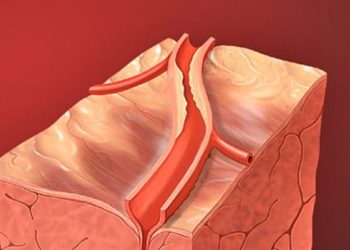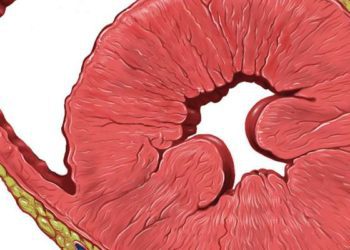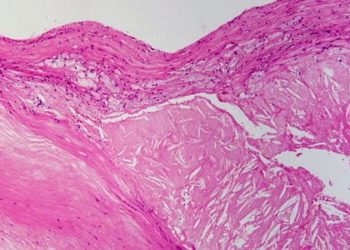Evinacumab may be effective in reducing lipid levels in patients with refractory hypercholesterolemia
1. After 16 weeks of treatment, patients who received evinacumab had decreases in low density lipoprotein (LDL) of up to 50% depending on dose, while those who received placebo experienced virtually no change.
2. The method of administration, subcutaneous vs. intravenous, did not appear to impact the agent’s efficacy or safety.
Evidence Rating Level: 1 (Excellent)
Study Rundown: Over 5% of adults in the United States are diagnosed with severe hypercholesterolemia, which is associated with atherosclerotic cardiovascular disease and coronary artery disease. Many treatment options such as statins, ezetimibe, and PCSK9 inhibitors, are ineffective for some patients, especially those with mutations in the low-density lipoprotein receptor gene, and invasive approaches such as apheresis can be inaccessible or prohibitively costly. Angiopoietin-like 3 is a hepatokine that regulates lipid metabolism by inhibiting lipoprotein and endothelial lipases; knockout of the gene has been shown to reduce levels of all three major lipid traits: LDL, HDL, and triglycerides. Evinacumab is a fully human monoclonal antibody against this protein and has been shown in phase 2 and phase 3 trials to successfully reduce LDL level even in patients with homozygous mutations in the LDL receptor gene. In this study involving patients with various forms of refractory hypercholesterolemia, both subcutaneous and intravenous evinacumab were found to prompt immediate decreases in lipid and atherogenic lipoprotein levels that were sustained through the last follow-up at 16 weeks, whereas patients who received placebo had no change from baseline in these measures. More than half of the patients in all groups experienced at least 1 adverse event, and the frequency of serious adverse events ranged from 3-16%. While this study was limited by a small sample size, a lack of racial heterogeneity, and a short treatment duration, these results nonetheless suggest that evinacumab may have significant therapeutic benefit for patients with hypercholesterolemia who have exhausted other treatment options.
Click here to read the study in NEJM
Relevant Reading: Evinacumab for Homozygous Familial Hypercholesterolemia
In-Depth [randomized controlled trial]: This double-blinded, multicenter phase 2 trial involved 272 adults with primary hypercholesterolemia refractory to both a PCSK9 inhibitor and a statin at maximum dose. Patients were randomly assigned to either the subcutaneous or intravenous groups. Those in the subcutaneous group were assigned in a 1:1:1:1 ratio to receive 450 mg weekly, 300 mg weekly, 300 mg every 2 weeks, or placebo weekly; those in the intravenous group were assigned in a 1:1:1 ratio to receive monthly administrations of 15 mg/kg, 5 mg/kg , or placebo. At 16 weeks, all evinacumab groups experienced dramatic decreases in LDL level in a dose-dependent manner while both placebo groups had slight increases from baseline. Of the patients who received subcutaneous evinacumab, those who received 450 mg per week, 300 mg per week, and 300 mg per 2 weeks had a reduction of 47.2 percentage points (difference vs. placebo, -56.0; 95% CI, -73.7 to -38.3), 44.0 percentage points (difference vs. placebo, -52.9; 95% CI, -70.7 to -35.1), and 29.7 percentage points (difference vs. placebo, -38.5; 95% CI, -56.5 to -20.6), respectively. Of the patients who received intravenous evinacumab, those who received 15 mg/kg monthly had a reduction of 49.9 percentage points (difference vs. placebo, -50.5; 95% CI, -68.4 to -32.6), and those who received 5 mg/kg monthly had a reduction of 23.5 percentage points (difference vs. placebo, -24.2; 95% CI, -42.6 to -5.7). HDL levels also changed dramatically in the subcutaneous groups (-27.9%, -30.3%, and -19.5% vs. -1.7% with 450 mg weekly, 300 mg weekly, and 300 mg biweekly vs. placebo) as well as the intravenous groups (-31.4% and -14.9% vs. 1.9% with 15 mg/kg and 5 mg/kg vs. placebo). Adverse events occurred at a numerically higher frequency in the treatment groups versus placebo, some of the most common being headache, urinary tract infection, nasopharyngitis, and gastrointestinal upset. No clinically significant differences in adverse events were observed between the subcutaneous and intravenous groups.
Image: PD
©2020 2 Minute Medicine, Inc. All rights reserved. No works may be reproduced without expressed written consent from 2 Minute Medicine, Inc. Inquire about licensing here. No article should be construed as medical advice and is not intended as such by the authors or by 2 Minute Medicine, Inc.









